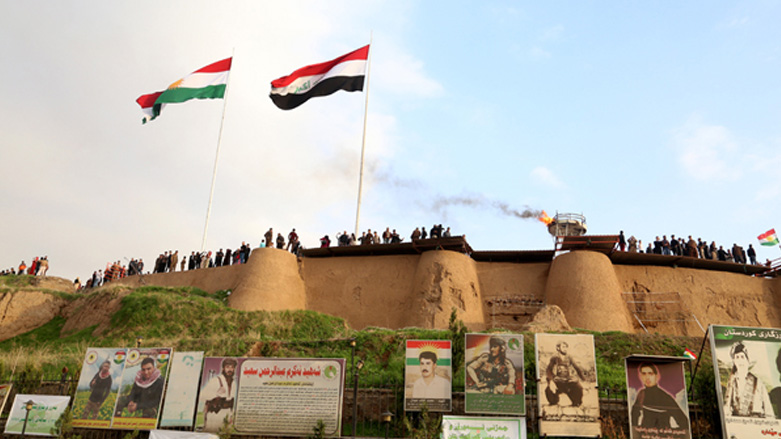KDP and Turkmen party strike deal on disputed province of Kirkuk

ERBIL (Kurdistan 24) – The Kurdistan Region’s leading party recently agreed with a local Turkmen party in Kirkuk on several issues, including the “normalization“ of security in the disputed province, local elections, and the suspension of decisions on agricultural lands issued by the former regime.
The deal came during a meeting in Erbil between the head of the Kurdistan Democratic Party (KDP) Leadership Council of Kirkuk, Kamal Kirkuki, and Riyadh Sari Kahya, chairman of the Kirkuk-based Turkmen-Ili party.
According to a statement issued by the KDP, both sides stated that Kirkuk is a city of peaceful co-existence with “no major problems“ between its ethnic and religious groups and called on the federal government of Iraq “to expedite the process of normalization and resolve all the issues in Kirkuk related to military, security, politics, administration, and public services.”
They also agreed that they should ask the Iraqi Parliament to create and pass a bill that would suspend the decisions issued by the former Baath Party that govern the use of agricultural lands in the province.

The KDP and Turkmen Ili said they decided to work with other parties to agree on holding Kirkuk's provincial election after the national census is scheduled to be held next year to prepare the ground for holding a fair election, free of the claims of vote-rigging and fraud that plagued the 2018 national vote. They noted that Iraq’s Independent High Electoral Commission (IHEC) should effectively ensure that the election is transparent.
Regarding the selection of the province’s next governor, both sides were in agreement that Kirkuk Provincial Council (KPC) should elect a candidate for the post after “normalizing“ the situation in the province and re-activating the council in order to let the it “play its constitutional and legal duty” in consensus with all its members.
Both sides expressed their support for the current cabinet in Baghdad in resolving various disputes in Kirkuk.
The agreement came less than two weeks after Kahya met with KDP leader and former President of the Kurdistan Region, Masoud Barzani.
On Oct. 16, 2017, Iraqi forces and Shia-dominated militias attacked and took over Kirkuk and other disputed territories in response to the Kurdistan Region's independence referendum held the month before. Kurdish Peshmerga fighters withdrew from those areas, avoiding major clashes to strengthen their lines in the Kurdistan Region.
Tens of thousands of people were displaced in the oil-rich and ethnically diverse province, most of them Kurdish.
Since then, it has witnessed instability and an increasing number of insurgent attacks by Islamic State militants and unknown gunmen.
The term “normalization“ in Kirkuk has usually referred to a proposed demilitarization of the province by Baghdad, a return of Peshmerga and other Kurdish security to the area, handing over the security file of the province to local police forces, restoring authority to local civil administration, and reactivating the KPC.
Kirkuk is claimed by both the Kurdistan Regional Government (KRG) and the federal government of Iraq. The population is made up of Turkmen, Arabs, Christians, and a Kurdish majority.
The future of the province was constitutionally mandated to be determined through a referendum as outlined in Article 140 of the Iraqi constitution, which mandated that the vote was to be held before the end of December 2007. More than a decade after the deadline, the article remains wholly unimplemented.
Editing by John J. Catherine
